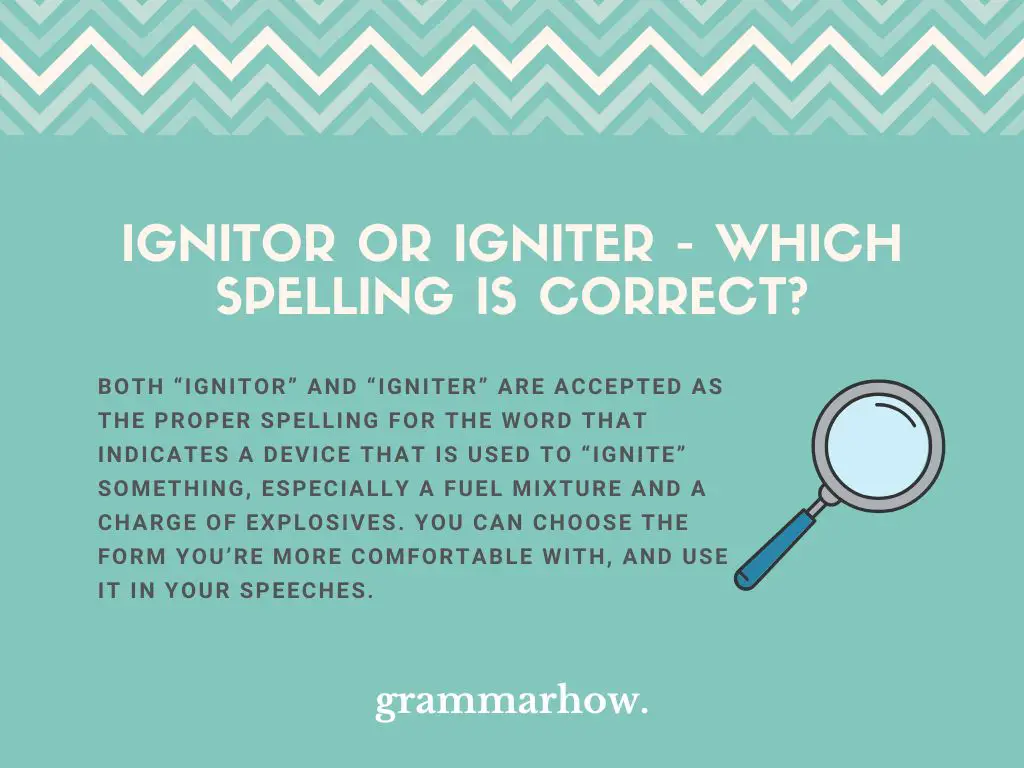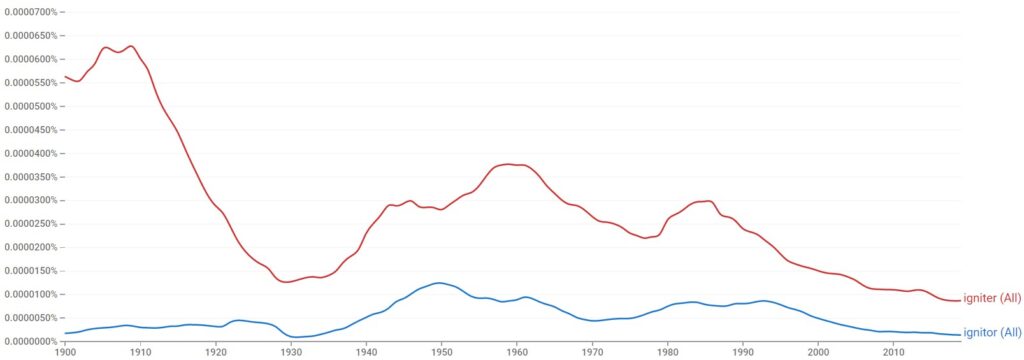When talking about something burning or exploding, do you use the word “Ignitor” or “Igniter”?
We want to know what is the correct form of this word, and which we should avoid. We also want to know what’s the correct meaning and appropriate use for them.
Ignitor or Igniter – Which Spelling Is Correct?
Both “Ignitor” and “Igniter” are accepted as the proper spelling for the word that indicates a device that is used to “Ignite” something, especially a fuel mixture and a charge of explosives. You can choose the form you’re more comfortable with, and use it in your speeches.

Let’s see some examples:
- Don’t mess around with the ignitor, please.
- Don’t mess around with the igniter, please.
The sentences in the examples are identical, except for the fact that one uses “Ignitor” and the other uses “Igniter”. As you can see, both words work fine and are considered to be correct.
One form may sound strange to you, depending on how people around you usually speak. But it doesn’t mean that one or the other would be incorrect. “Ignitor” and “Igniter” are alternates.
Therefore, we can affirm that “Ignitor” and “Igniter” are synonyms that can interchange in a sentence, without harming the meaning a person is attempting to convey.
Ignitor
“Ignitor” is an alternate spelling for the word “Igniter”, which indicates a device that’s used to “Ignite” something, or set something on fire. It can also indicate a substance that acts as an “Ignitor”.
The Cambridge Dictionary doesn’t acknowledge “Ignitor” as a word. The Merriam-Webster Dictionary, on the other hand, forwards the reader to the definition of “Ignite”, which reads: “to subject to fire or intense heat”.
Even with the lack of a proper definition of the word “Ignitor”, we can affirm that this is a valid word, with meaning and purpose, that you can use in your sentences if you want to.
Let’s take a look at some examples:
- Do we have ignitor liquid at home?
- The ignitor of the grill isn’t working. Can you fix it?
- Does the car need a new ignitor?
- The stovetop ignitor isn’t working.
- I’ve been trying to buy a new ignitor, but I can’t seem to find one.
- The ignitor should have started the burning process by now.
Igniter
“Igniter” is the conventional spelling for the word that can also appear as “Ignitor”. That’s because “Igniter” resembles the original word, which is “Ignite”. To “Ignite” is to subject something to intense heat or fire, and “Igniter” is the device or substance that provokes this process to start.
Just like with “Ignitor”, The Cambridge Dictionary doesn’t acknowledge “Igniter” as a word. The Merriam-Webster Dictionary also forwards the reader to “Ignite”, when we search for the word “Igniter”, which is (as we see it) some sort of acknowledgment.
Take a look at the examples below:
- Did you bring igniter liquid?
- The igniter in the machine isn’t working.
- The igniter mechanism in the oven needs repair.
- The car igniter provides a high voltage spark for fuel ignition.
- I need some spare ignition plugs.
- The igniter in the machine starts at the scheduled time.
Which Is Used the Most?
Which one of those forms is used more often, “Ignitor” or “Igniter”? Take a look at the graph from Google Ngram Viewer below.

“Igniter” is the word that appears in the graph as the one used more often. The graph also indicates that it has always been the most used one, despite having experienced some ups and downs over the years.
“Ignitor” has always been the least used form of this word.
Keep in mind that both “Igniter” and “Ignitor” are correct forms. They are alternate spelling for the same word and are both considered to be proper and acceptable to use. The question is, which one is your favorite? Choose the one you’re more comfortable with, and go with it.
Final Thoughts
To “Ignite” something is to subject it to fire or intense heat. The device (or substance) used to generate the ignition is called “Ignitor” or “Igniter”. Both forms are accepted as proper spelling and can be used in speeches. Choose the one you’re more comfortable with.

Martin holds a Master’s degree in Finance and International Business. He has six years of experience in professional communication with clients, executives, and colleagues. Furthermore, he has teaching experience from Aarhus University. Martin has been featured as an expert in communication and teaching on Forbes and Shopify. Read more about Martin here.
